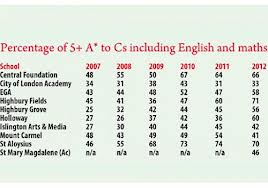
There has been a drop in the proportion of General Certificate of Secondary Education examination entries awarded top grades, for the second year in a row.
More than 600,000 teenagers in England, Wales and Northern Ireland are receiving results, with head teachers saying changes have caused “a lot of turbulence” in grades.
About two-thirds of exam entries were graded between an A* and a C – a fall on last year.
And the proportion getting an A* or an A fell from 22.4 per cent to 21.3 per cent.
The overall pass rate also fell marginally, for the first time in the exam’s 25-year history.
The results – released by the Joint Council for Qualifications – also show more pupils are taking exams early (particularly in Mathematics and English), a rise in re-sits and teenagers being entered for more than one exam in the same subject.
The JCQ says these early entries are partly responsible for the drop in results because 16-year-olds are outperforming younger pupils, together with falls in science grades.
It says they are a “damaging trend”, not in the best interests of pupils and driven by the league tables, where schools are measured on how many pupils get at least a C grade in English and Mathematics.
In English, the proportion of entries awarded A*s to Cs fell by 0.5 percentage points, to 63.6 per cent. In Mathematics, the fall was 0.8 percentage points.
There was a big fall in pupils getting top grades in all the sciences, following the introduction of new syllabuses and exams.
This year 53.1 per cent of science entries were awarded between an A* and a C, down from 60.7 per cent last year. That drop – of 7.6 percentage points – was the biggest fall in top results across all the subjects.
Smaller falls were seen in the separate sciences and in additional science too.
The results also show an increase in those taking foreign languages and humanities at GCSE level.
This trend is likely to be linked to the introduction in the autumn of 2010 of a new league table measure, known as the English Baccalaureate, which now rates schools on how many pupils get good GCSEs in such subjects, as well as sciences and English and Mathematics.
Entries for geography jumped by 19.2 per cent this year, while those for history rose 16.7 per cent.
Entries for traditional modern foreign languages – French, German and Spanish – are up by 16.9 per cent compared with last year, reversing a long-term downward trend.
Education Minister Elizabeth Truss said: “It is very pleasing to see the increase in these important subjects – the ones that will keep pupils’ options open in the future. I am particularly delighted to see a languages revival.
“The EBacc is the platform for young people to go on to A-levels and high-quality vocational study. It will help them compete with their peers in the world’s best education jurisdictions.”
‘Significant turbulence’
Michael Turner, director of the JCQ, said: “There are many underlying factors affecting this year’s GCSEs, including a sizeable increase in entry by 15-year-olds, new science specifications designed with greater challenge, early and multiple entry in mathematics and an increase in the number of students taking IGCSEs [international GCSEs].
“All of these have had an impact on results,” he added.
Culled from bbcnews

No comments:
Post a Comment